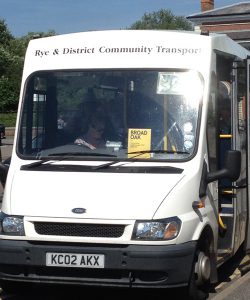SUNDAY ROUTES
FACE THE AXE
Big cuts to local bus services are on the cards that could affect both local rural communities as well as the vulnerable and less well off in Rye town.
The cuts being considered by East Sussex County Council could see some Sunday and evening services going, hourly services being cut to every two hours, and other services, including Dial-a-Ride, being reduced to only two days a week.
Services affected could include the 312 bus to RyeHarbour, the 344 to Northiam and Fairlight, and in particular the 326 around the outskirts of Rye.
Rye Community Transport may be particularly hard hit by the cuts, even though its buses are often full, particularly on Thursday’s market day. “Some residents rely absolutely on Dial-a-Ride”, said Sam Souster, Rye’s rural district councillor. “It is a public service and essential”.
The meeting of Rye council on June 30 was told by Keith Glazier, county council leader, that the proposals were going out for consultation – from July 7 to the end of September.
East Sussex council says that over 95 per cent of the population will still have access to six days a week services, if the cuts are made, but this excludes Sundays and evenings. If the figures are accurate, they mean that one in five (including all the car owners) may only have buses on two days a week or every two hours.

Age UK has said rural bus cuts are having a damaging effect on elderly people, isolating them and cutting them off from essential services like hospitals. Services like the 340 and 100 from Rye currently go to Conquest Hospital in Hastings, but may face cuts.
“Many of the people I represent are elderly and/or are not car users,” said Souster, “and totally rely on the bus service to shop, go to the doctor or hospital.”
In country areas many face growing isolation with long walks to the nearest bus stop, and Gillian Merron of Age UK said: “It undermines the whole idea of providing free bus travel when there’s no bus to travel on”.
The Local Government Association recently said that government funding for free off-peak travel for the elderly and disabled has dropped by 39 per cent; and a recent Labour Party survey said funding had dropped by more than 25 per cent since the last General Election. A government spokesman said in April that the Government provided funding to meet the cost of subsidising off-peak travel, but did not give any details on how much.
Cuts in rural services have been widespread in recent years, but some have been challenged. A service in Rode, Somerset, which had meant a walk of more than a mile to the nearest bus stop (which lacked a shelter) was restored this week after local protests showed bus company statistics were inaccurate.
Photos: Dan Lake


